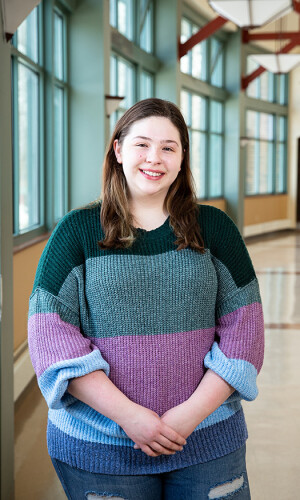Last summer, Magdaline McDonald ’22, a Spanish and English double major from Chisago City, Minn., found a way to help the school district in her hometown and continuing honing her Spanish speaking skills despite the pandemic.
By Magdaline McDonald ’22
During the summer of 2020, I was able to pursue an amazing opportunity to utilize my Spanish language skills by interacting directly with native Spanish-speakers in my community.
When school districts and colleges shut down to help prevent the spread of COVID-19, there was concern nationwide about how online learning was going to start impacting children and their families. In response to these concerns, Minnesota School District 12, my old district, began a free lunch program that would allow the children in our community to receive a free lunch every weekday, as well as an opportunity to interact directly with teachers and paraprofessionals to get help when they needed it as they adjusted to online learning.
This program became especially important for Hispanic families in our district, as online learning was a new concept for most all students and families, and the frequent updates on the district status and methods of online learning were virtually only presented in English. To help bridge this gap, and ensue that students from Spanish-speaking households were getting the proper help they needed to adjust to online learning, Kathy Cordero, the school’s cultural liaison Hispanic/EL paraprofessional, and I would be present and available at one of the free lunch stations every weekday. We would spend our time reading with elementary children still learning English and relating any new information regarding the school to families who spoke little to no English.

We would greet families and convey and important information they needed to know, as well as answer any and all questions they had about what was going on at school, questions such as whether the school was opening for students in shifts, and as the year ended how their fifth graders could pick up their elementary school diplomas for completing the year. For several families we even set up school-provided tablets and taught the students how to use them for their school work, and provided parents with the information they needed to help their child as they transitioned to having the tablet as their main form of contact with teaches and their curriculum.
This program was amazing experience, not only because it allowed me to give back to my community, but also because I was able to practice my speaking and listening comprehension in a natural and important way. I found myself growing as a speaker and even more so as a listener. It took me a while to properly grasp different accents and lingo from different families, but I was soon able to comprehend without issue, and as time went on this exchange became much more natural to me than what I had experienced only in a classroom.
This experience overall was extremely helpful to my learning because it fully submerged me in the language itself and pushed me to grow as a speaker, as it was vital that I was able to communicate clearly and efficiently to both adults and children. I developed the ability to easily change my speech in a way relative to the individual I was talking to (such as changing word choices for adults versus children, as well as changing verbs based on lingo used by individual families).
